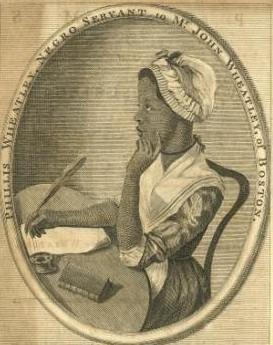What's 'heroic' about it anyway?

I spent an entire day teaching heroic couplets. I taught my tail off in Forms of Poetry, covering heroic couplets from Anne Bradstreet (1612–1672) to Thom Gunn (1929–), and followed up in African American Literary Heritage with a session on Phillis Wheatley, the young slave girl who wrote almost exclusively in heroic couplets.
What causes such a form as the heroic couplet to endure? What do “The Author to Her Book” (Bradstreet) and “The J Car” (Gunn) have in common, if anything? As I looked over the range of poems we discussed in class, I concluded that the particular space of the heroic couplet, in which the end-stopped rhymes (AABB, etc.) close off each rhyming pair in the manner of a stanza or little room, lends itself to contemplative thought. Each two-line reflection builds into a larger meditation, for Bradstreet on the status of women poets and for Gunn on the loss of a friend and promising writer to AIDS.
Wheatley, the first African American to publish a book (Poems on Various Subjects, Religious and Moral, 1773), became familiar with the form through her study of Alexander Pope, as well as Pope’s translations of Homer. (See: it really does all come back to the epic.) A still controversial, or at least enigmatic literary figure, Wheatley was educated along with the children in the Wheatley household after being purchased by John Wheatley for the purposes of being his wife’s maid. In reading Wheatley, we are confronted with many of the hypocrisies on which this nation was founded: in particular that of those persons who espoused Christianity and freedom while owning slaves.
Studying Wheatley brings together two of my current fascinations: lineages and the endurance of inherited poetic forms. Really, who wouldn’t be fascinated by the possibilities and contradictions inherent in a young slave girl making an epic, heroic form her own? Consider this final couplet from “On Being Brought from Africa to America”: “Remember, Christians, Negros, black as Cain, / May be refin’d, and join th’ angelic train.” The commas in the poem’s penultimate line have always been particularly interesting to me: “Remember, Christians, Negros, black as Cain.” This line is a warning to Christians chastising them to remember that God loves all equally, but the comma between “Christians” and “Negros” also enacts a leveling between the white Christians whom the poem addresses and “Negros” by listing them symmetrically. Christians and Negros become equal. The punctuation supports the content.
Despite the difficulties of teaching Wheatley (in this case to a class made up of freshman and college sophomores) and despite some of the imagery in the poem that we might chafe against (she describes Africa as a “pagan land”) I am of the opinion that there is indeed something heroic to be found in close readings of Wheatley. If my students disagree, I am all for analyses that can be backed up by rigorous textual analysis. What I really want them to remember — and poetry teaches us this lesson — is that not understanding something and not liking something are two different things. We all need this lesson in these times.
Epic worlds